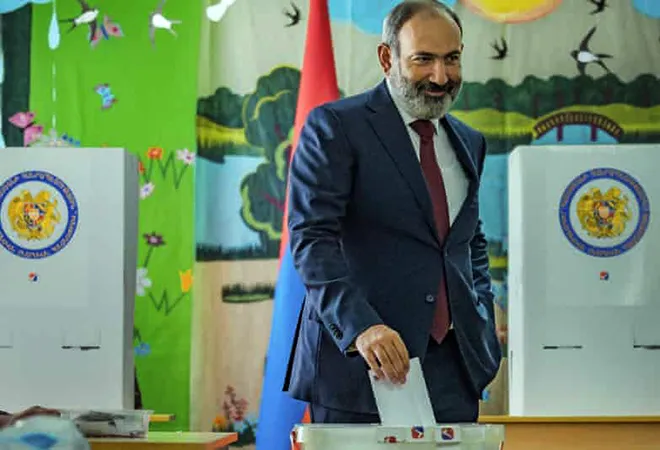-
CENTRES
Progammes & Centres
Location

On June 27, Armenia’s Central Electoral Commission (CEC) announced the results of the 20 June 2021 snap parliamentary election. The previous time Armenia elected its parliament had also been in a snap election, held in December 2018, following the April 2018 Velvet Revolution that ousted Armenia’s old elites and brought a new group of people to power.
This time, the need for a snap election stemmed from Armenia’s defeat in the autumn 2020 war with Azerbaijan for Nagorno-Karabakh. Thousands of Armenian soldiers were killed or maimed. The Armenian-populated Nagorno-Karabakh Republic survived, albeit minus about three-fourths of its territory. Russian peacekeepers were flown in after the war to ensure the physical existence of what is left of this internationally unrecognised republic. As to its status, Azerbaijan no longer agrees to discuss it. Azerbaijan’s official position is that the war resolved the territorial problem, and, therefore, enabling communications and post-war rehabilitation of the region is all there is to talk about. Azerbaijan’s assertiveness, natural for the victor, is enhanced by its strengthening alliance with Turkey and also with Pakistan, a country that supported it in the war.
Following the massive loss of life and the humiliation of defeat, Armenia’s post-revolution authorities needed to prove they still had the society’s support. They held a snap election, and it worked. The Civil Contract, whose list is topped by Nikol Pashinyan, Armenia’s leader since the revolution, won 53.94 percent of the poll, against 21.09 percent votes cast for the main competitor, the Armenia Alliance led by Robert Kocharyan, Armenia’s President between 1997-2008. The two frontrunners, thus, got 71 and 29 seats in the Parliament, respectively. No other player made it past the threshold but, since the constitution requires at least three parties to have seats in the Parliament, seven mandates went to the I Have Honor Alliance with a mere 5.22 percent of the poll, below the 7 percent threshold for alliances but still more than any other party. Formally led by the ex-head of the National Security Service, Artur Vanetsyan, the alliance includes the Republican Party that ruled Armenia up to the 2018 revolution.
On top of a renewed mandate to govern Armenia, the election, thus, gave the Civil Contract the right to form the government on its own, without any need for alliances. The low turnout of just 49.4 percent was the key to its victory. Like it usually happened in the former Soviet republics, supporters of incumbents were more mobilised and incentivised to vote. Many of the voters, devastated by the war, saw no point in casting a ballot: As long as one can’t reverse the defeat or bring back the dead, it no longer matters who is in power.
Most campaign debates weren’t about development prospects or reforms but about who had been more patriotic or heroic during the war. Armenian society is aware that it is not ready to go and win Nagorno-Karabakh back again. Accordingly, none of the competing 26 political parties had anything to offer the voter within that agenda. The post-war shock, frustration, and apathy made the two main competitors look very much alike to the general voters, especially as neither proposed any practical positive steps. Both the ruling party and the opposition built their campaigns on negative statements.
Armenian society is aware that it is not ready to go and win Nagorno-Karabakh back again. Accordingly, none of the competing 26 political parties had anything to offer the voter within that agenda. The post-war shock, frustration, and apathy made the two main competitors look very much alike to the general voters, especially as neither proposed any practical positive steps. Both the ruling party and the opposition built their campaigns on negative statements.
The Civil Contract warned voters that should they fail to elect it, power in Armenia would go back to the old regime overthrown in 2018, whose corrupt and incompetent governance over decades had led to defeat in the war, leaving the new leaders just three years to fix all the problems, which hadn’t been enough. The opposition, in its turn, argued that the new elite lacked the capacity to rule the country or the capacity to learn, and had, therefore, lost the war.
As a result, many of the people who didn’t want to vote for Pashinyan didn’t want to vote for Kocharyan either. They either didn’t come to the polls, or voted for one of the numerous parties that stood no chance of making it to Parliament, thereby, helping Pashinyan to win a constitutional majority. The votes cast for parties that don’t pass the threshold are redistributed amongst winners in proportion to their share of the poll. Accordingly, most of the votes cast for the underdogs went to the Civil Contract.
All the campaigns were also similar when it came to foreign politics. Strictly speaking, there was no room for variety. Russia will remain the key player in this region. Armenia’s membership in the Collective Security Treaty Organisation (CSTO) and the Eurasian Union is not questioned by any of Armenia’s prominent political players or policy analysts. Pashinyan is Moscow’s counterpart in ensuring the fulfillment of conditions prescribed by the joint statements on Nagorno-Karabakh. There is no outlook for replacing Moscow with another external player. Azerbaijan’s main ally Turkey is a NATO member; its support to Azerbaijan has been unequivocal during the war and has remained so. This leaves no alternatives to Armenia’s foreign policy orientation towards Russia. So, the voters had no choices in this realm either.
The election won’t make the political crisis go away. Armenia’s society will remain polarised and traumatised and politics will stay radicalised. Still, from the streets, the main tensions will now move into the Parliament, which now includes parties that will come up with harsh criticism of the government. However, they have no leverage over decisions as long as the ruling party has a constitutional majority.
Armenia’s society will remain polarised and traumatised and politics will stay radicalised. Still, from the streets, the main tensions will now move into the Parliament, which now includes parties that will come up with harsh criticism of the government. However, they have no leverage over decisions as long as the ruling party has a constitutional majority.
The opposition will have plenty of occasions to accuse the government of incompetence and ill will. Armenia has a lot on its hands following the war, including complicated negotiations on communications and border delineation. Arguments and tensions are unavoidable, and there are few good options and little hope for quick improvements. All the challenges faced by Armenia’s society and public administration are long-term. They will all take time and effort. The current regime has ensured its bureaucratic legitimacy for another five years by securing a post-war mandate. However, its societal legitimacy will crumble; yet another snap election is a distinct possibility.
The views expressed above belong to the author(s). ORF research and analyses now available on Telegram! Click here to access our curated content — blogs, longforms and interviews.

Alexander Iskandaryan is Director of the Armenia-based Caucasus Institute.
Read More +